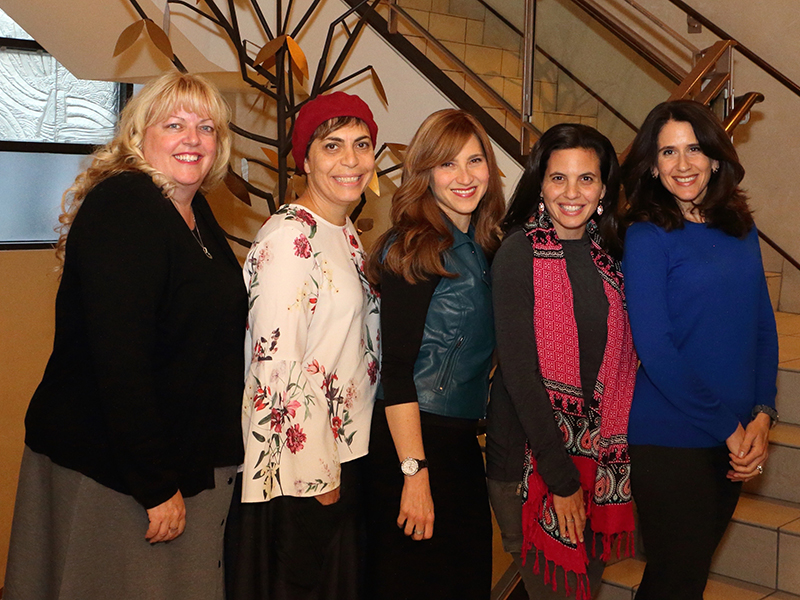Years ago, a group of women gathered from across the Jewish spectrum to brainstorm about how to energize the next generation. They concluded that if you inspire a woman, you inspire a family, and if you inspire a family, you can change the world. This is how the Jewish Women’s Renaissance Project (JWRP) was born.
JWRP enlists thousands of women from around the world to participate in a life-changing experience in Israel.
Last June, JWRP launched the Momentum Fellowship program exclusively for its alumni – a pilot program designed for women who are interested in growing their abilities, which JWRP hopes will foster leadership within the Jewish community. Women from Toronto, Israel, Washington and Denver participated in a three-day retreat that was held in Baltimore.
Following a rigorous application process, four Toronto women were selected: Jori Lichtman, Sharon Neiss-Arbess, Ariella Eben-Ezra and Lisa Black-Meddings. Each of them run projects designed to improve their communities.
“Their projects are meant to unify and empower. We know the most powerful way to keep a movement growing is not to have top-down leadership, but to have bottom-up engagement, enthusiasm and excitement by giving women the power and the tools to continue growing as leaders in their communities,” said Ilana Rubenstein, JWRP city leader and the cohort’s facilitator.
The women have been brainstorming monthly, sharing logos, business plans and dreams, in order to put their plans into action, and taking their inspiration and paying it forward in their communities, schools, synagogues and beyond.
READ: WOMEN’S ISRAEL TRIPS TO ‘EMPOWER’ JEWISH MOTHERS
Lichtman’s project is called The Shabbat Club, which she says “is for people craving more Judaism in their lives, but who don’t know where to start. My concept is to gather families, individuals or couples who want to enjoy a meaningful Shabbat dinner, utilizing ‘table talkers’ created by rabbis, rebbetzins and other community leaders. Table talkers will help inspire meaningful and approachable dialogue at the table, such as the Torah portion of the week, an upcoming holiday or a Jewish value.”
Author Sharon Neiss-Arbess wrote Me and My So-Called Friends, a story about a 15-year-old girl who survives a difficult year at school, while delivering life lessons woven in Jewish values. Neiss-Arbess’s Brave the Waves Programs for Teen Resiliency is a teaching tool that was born from Me and My So-Called Friends.
“I have formed an advisory board of mental health experts and teachers. Together, we have created workshops using the book as a teaching tool, implementing life lessons around bravery and kindness, and how to survive when you hit rock bottom,” said Neiss-Arbess.
Eben-Ezra created a series of interactive programs designed for mothers and daughters ages eight to 13, which allows them to connect in a meaningful way by exploring values, morals and choices.
“B’not Israel is a series of dynamic, innovative, value-focused programs that I have created based on Jewish wisdom for mothers and daughters. I apply Torah study – discussing core values and character traits through our sages and through the Ten Commandments, bringing them to life today. Each program is 12 weeks long. I am working on packaging it for others to use in their communities,” said Eben-Ezra.
“Imagine mothers sitting with their daughters, watching them think through and discuss complex issues of identity, womanhood, love and beauty. Imagine strengthening family ties and re-visiting choices. Imagine the bonding that occurs as they co-learn with a facilitator who models how to engage in value-focused thinking.”
As a Pickering, Ont., resident who realized there was a lack of Holocaust and genocide education in her community, Black-Meddings created a program called Learning From Our Past: Tools For Tolerance.
“The goal is not just imparting the education, but doing it in a way where the curriculum will empower teens who are living in outlying areas to become leaders in their communities. I have proposed a six-week program over a period of four to six months about Holocaust history and anti-Semitism and how to use history as a tool to discuss tolerance with teens and to try and reach teenagers who wouldn’t have the same access to programs that others would have up and down the Bathurst Street stretch,” said Black-Meddings.
To learn more, or to register for these programs, email [email protected].







